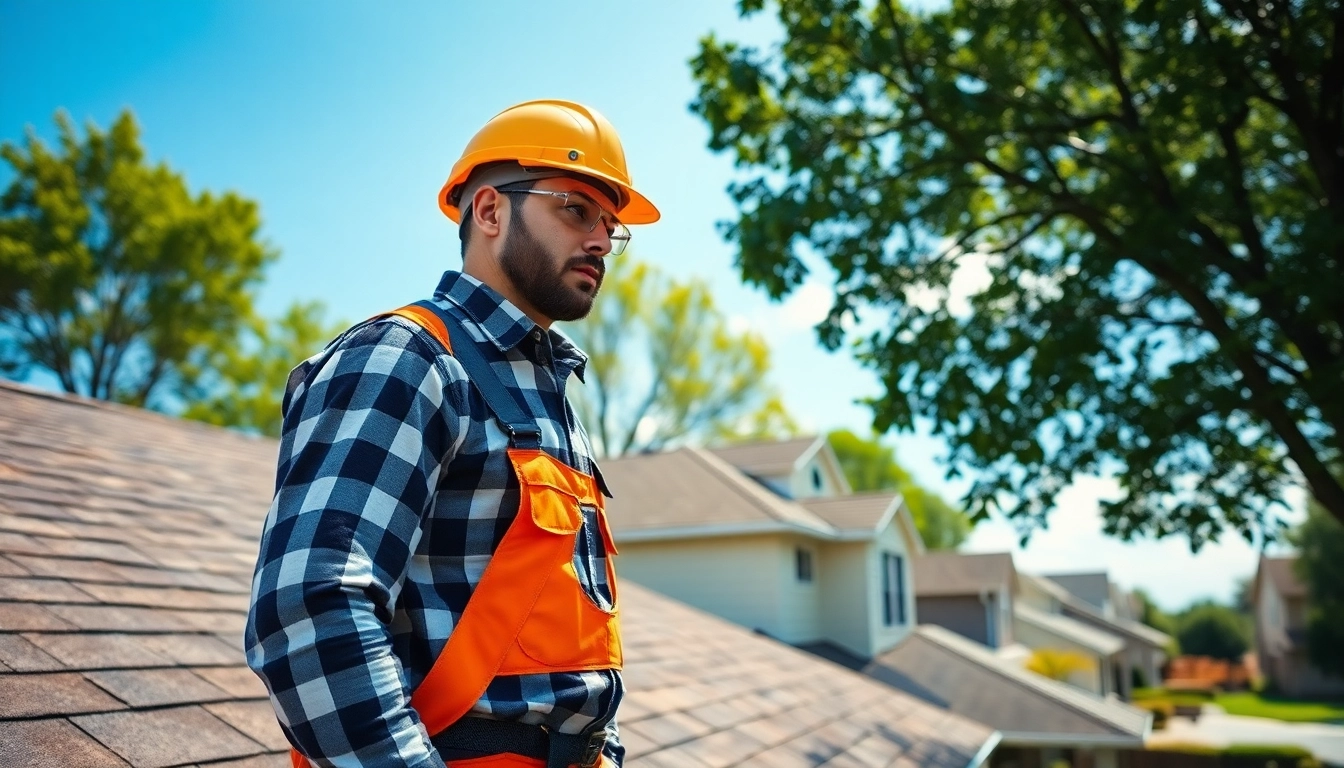Finding the Right Local Roofers Near Me: A Comprehensive Guide to Quality Roofing Services
Understanding the Need for Local Roofers Near Me
Finding local roofers near me is essential for homeowners seeking reliable and efficient services for roofing needs. While roofs are vital for protecting your home, they are also prone to wear and tear due to weather, time, and various environmental factors. In this section, we will discuss why local expertise is important, the common issues that may arise with your roof, and how to recognize quality roofing services.
Identifying Common Roofing Issues
A roof is exposed to constant elements, making it susceptible to various issues that can affect its performance and longevity. Understanding these common problems enables homeowners to recognize when they need professional assistance. Here are some prevalent roofing issues:
- Leaks: Water leaks can lead to serious damage, including mold growth and structural deterioration. Identifying signs of water damage, such as stains on the ceilings or walls, can help catch leaks early.
- Missing or Damaged Shingles: Shingles may crack, curl, or become dislodged due to severe weather or aging. Regular inspections help spot these issues before they escalate.
- Poor Installation: A roof installed incorrectly can lead to various problems, including leaks and shortened roof lifespan. This is why hiring qualified local roofers is critical.
- Blocked Gutters: Clogged gutters can lead to water pooling on the roof, increasing the risk of leaks and structural damage.
Importance of Local Expertise
Choosing local roofers comes with unique advantages. Local contractors have a better understanding of the specific weather patterns and building regulations in your area. Their familiarity with the community can result in more personalized service, as they often rely on their reputation and referrals to sustain their business. Additionally, local roofers can quickly respond to emergencies and ensure compliance with local building codes.
How to Recognize Quality Roofing Services
Evaluating the quality of roofing services can be daunting, but several indicators can help you gauge the reliability of local roofers:
- Certifications and Licenses: Reputable contractors possess the necessary licenses and certifications to perform roofing work legally and safely.
- Insurance: Ensure that the roofing company is insured to protect you from liability in case of accidents during the project.
- Warranties: A reliable roofer will offer warranties on both labor and materials, providing peace of mind that they stand behind their work.
- Transparency: Quality roofing companies are clear about their pricing, processes, and timelines, providing detailed estimates.
How to Find Local Roofers Near Me
Finding local roofers can often feel overwhelming, especially with countless options available online. However, by employing the right strategies, you can simplify the process and find a reliable contractor. Below are several tried-and-true methods:
Utilizing Online Platforms
Today, many homeowners turn to online platforms to discover local services. Websites such as Yelp, Angie’s List, and Google My Business feature customer reviews that can guide you in choosing the right roofer. When using these platforms, consider the following:
- Look for roofing contractors with high ratings and positive feedback.
- Pay attention to the number of reviews, as a higher volume may indicate a more reliable service.
- Examine any recurring complaints as they often reveal potential issues with the contractors.
Leveraging Community Recommendations
Your community can be an invaluable resource in finding trustworthy local roofers. Asking neighbors, friends, or family for referrals can lead you to reliable contractors who have successfully completed projects in your area. Additionally, consider checking local community boards or social media groups where individuals share their experiences and recommendations.
Checking Certifications and Licenses
Before hiring a roofer, verify that they possess the necessary certifications and licenses. Most localities require roofing contractors to be licensed, which ensures that they have met specific industry standards. You can check these credentials through state or local licensing boards or request proof directly from the roofing company.
Evaluating Local Roofing Companies
Once you’ve narrowed down your options, the next step involves thoroughly evaluating each potential roofing contractor to ensure they meet your needs and expectations. This can be broken down into several key areas:
Reading Customer Reviews and Testimonials
Customer reviews and testimonials provide insight into the experiences others have had with the contractor. Look for companies that consistently receive glowing reviews and address issues constructively. Platforms like Trustpilot or the testimonial sections on the contractor’s website can be particularly helpful.
Scheduling Consultations and Estimates
Most reputable roofing contractors will offer free consultations and estimates. During this process, assess how professional and knowledgeable they are. Consider these questions:
- Do they conduct a thorough inspection of your roof?
- Are they transparent about the required work and materials?
- Do they provide a written estimate detailing costs and timelines?
Assessing Contract Terms and Warranties
Before signing a contract, ensure you thoroughly read the terms. Pay attention to warranty details for both materials and labor. A solid warranty can be a strong indicator of quality work, while ambiguous terms may signal potential issues down the line. Ensure your contract includes critical details such as timelines, payment schedules, and scope of work.
Cost Factors Associated with Local Roofing Services
Understanding the cost breakdown of roofing services can help you make informed decisions when hiring a contractor. Here are several key components to consider:
Understanding Pricing Structures
Pricing structures in the roofing industry can vary widely depending on several factors, including company reputation, materials used, and the complexity of the job. Common pricing methods include:
- Per square foot: Many contractors charge by the square footage of the roof.
- Flat fee: For some projects, particularly repairs, a flat fee may be more appropriate.
- Hourly rate: Some roofers charge by the hour, especially for smaller jobs or consultations.
Factors Influencing Cost
Several factors can influence the final cost of roofing services, including:
- Material Type: Different materials come with varying costs, durability, and lifespans.
- Roof Size: Larger roofs naturally require more materials and labor.
- Location: Geographic area can impact labor costs and material availability.
- Complexity of the Project: More intricate designs or repairs can lead to higher labor costs.
Budgeting for Roof Repairs or Replacements
Budgeting is crucial when planning for roof repairs or replacements. Start by determining the ceiling price you are willing to pay and prepare for unexpected costs that may arise during the project. Setting aside an emergency fund can help accommodate any surprises without financial strain. It can be wise to consult multiple contractors to compare quotes before settling on a budget.
Maintaining Your Roof After Installation
Once your roof is installed or repaired, ongoing maintenance is essential to prolong its life. Here are several strategies to ensure your roofing remains in top condition:
Routine Maintenance Tips
Regular maintenance can prevent costly repairs down the line. Consider following these routine maintenance tips:
- Inspect the roof regularly for signs of damage or wear.
- Clean gutters and downspouts to avoid water pooling.
- Trim overhanging branches that can scrape or fall on the roof.
- Schedule professional inspections at least once a year.
Signs Your Roof Needs Repair
Being proactive about roof maintenance requires recognizing when repairs are needed. Some common warning signs include:
- Visible sagging in the roof deck.
- Shingles that are curling, cracking, or missing.
- Water stains on your ceilings or walls.
- Granules from shingles in gutters.
How to Prevent Common Roofing Problems
To minimize the risk of common roofing problems, consider these preventative measures:
- Invest in quality roofing materials that are appropriate for your climate.
- Implement proper ventilation in your attic to reduce moisture buildup.
- Ensure flashing is installed correctly to guard against leaks.
- Stay up-to-date on repairs and replacements, avoiding deferred maintenance.
Finding reliable local roofers is a crucial step in maintaining the safety and integrity of your home. By understanding common roofing issues, utilizing effective search strategies, evaluating potential contractors carefully, and committing to regular upkeep, you can ensure your roof remains a resilient shield against the elements for years to come.



